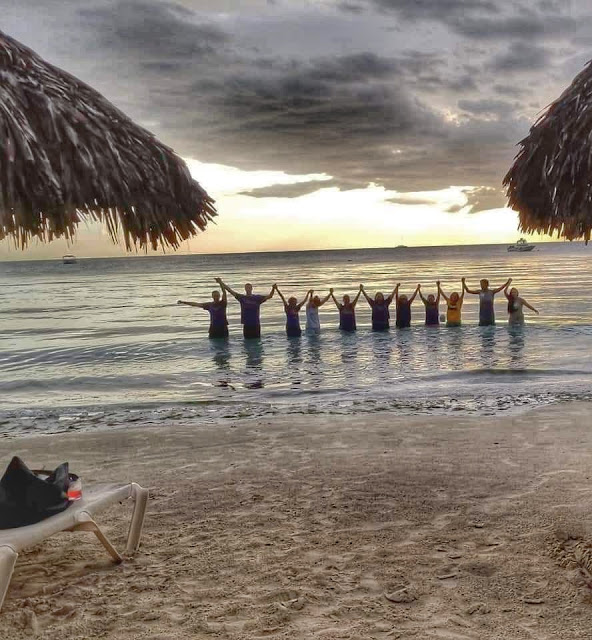As refraction is the main part of what we do on a daily basis Heather and I started on team refraction with the aim of working out the best prescription we could for patients with the target of 20/40 (equivalent to 6/12 in UK which is the UK driving standards).
The patient journey started with crowd control and getting people into a queue then entering the church to be booked in and those at risk due to age or family history were seen at the nurses station for blood pressure and blood sugar check. Everyone then moved onto the vision station where their unaided vision, or vision with current glasses if applicable was tested using logMAR letters, numbers or tumbling Es depending on literacy and communication. After this they moved onto pre-testing where they had their interocular pressure measured, were dilated, and had auto-refraction to give us an idea of their prescription. The big station was triage where the patient had their eye health checked, retinoscopy to see if auto-refraction was right and a decision was made whether the patient needed refraction and prescription glasses, to see the doctors for a pathology check or if they just needed glasses for reading and sunglasses. (Everyone was given sunglasses to protect their eyes from the harmful UV of the Caribbean sun). The refraction station was next where a patient's prescription was checked and if needed we could also refer to pathology for a health check. The doctors in pathology were able to prescribe medication for glaucoma, refer for cataracts but also to send over to our laser team who were performing laser operations for glaucoma and diabetic retinopathy. After all this patients who needed prescription glasses were sent to the dispensary where the best glasses for the patient were found or made if needed.
For the first half of the week we also had a team who went out into local schools to screen children and refer to the main clinic later in the week. This team was made up of a couple of optometrists and a couple of students and at the end of the week we saw a few of the screened children coming through and helped them out.
Each day started with an early start with breakfast around 7:30 then meeting up with everyone at the buses at 8:00 for quick brief, making sure we had all equipment and drinks for the day then loading up onto the mini-buses for the 30 minute commute. Every morning we arrived at the clinic to find a queue of people which only seemed to increase as the day went on. Upon arrival we would organise drinks, move any tables and equipment needed, and in my case re-stick the tarpaulin covering the windows back up as it fell down every single day!
The doors opened at 9 and the queue would slowly start to filter through the stations which meant that it took about 30 minutes before I saw a patient but once they started they kept coming for pretty much the whole day. The patients varied between fairly normal hyperopic prescriptions on patients who could communicate well to patients with high prescriptions, often astigmatism, who struggled to understand the test and my accent. Astigmatism and hyperopia were definitely the trends of the week, rather than the myopes we tend to see in the UK. Lunch was cooked by a team of cooks from the other side of Jamaica who had been brought over specially for the week and you just tried to take a break in a slight lull when others from your section weren't at lunch. It was typical Jamaica fare of rice and beans, chicken and vegetables.


And then it was back to the grindstone of doing our best to help out as many patients as we could for the day and week. We closed the doors at around half 3 to 4 to allow the last patients to work their way through the system and be dispensed before we finished the day and had everything packed up for around 5 o'clock. And then it was back to the resort for around half five to six for a much needed cocktail and to enjoy the sunset.
The one exception was on Tuesday evening when we held a clinic for Sandals staff and we saw 65 staff within the 2 hours we had for the clinic, which was a great evening and a thank you to them for putting up with us all week.
In total our team of 49 volunteers served 2,682 patients in 5 days, performed 1944 vision exams in the clinic (not all had refraction) and 702 exams in local schools, 110 SLT laser surgeries (for glaucoma), 33 diabetic retinopathy PROP surgeries and distributed 739 pairs of prescription glasses (98 made in clinic) with 34 custom orders from the US. We distributed 1205 pairs of reading glasses and 2119 pairs of sunglasses. PHEW!
It was an amazing week and the two days of relaxation at the end were much needed before flying back to the UK and back to the routine day job. Seeing all the patients out there handicapped by simple visual problems that could be easily treated here in UK really showed how much we take our sight for granted and that there will almost always be a solution to any ocular problem we have via the NHS or private optometrists, and why it is so petty when people complain about the price of eye drops or a sight test (rant over).













